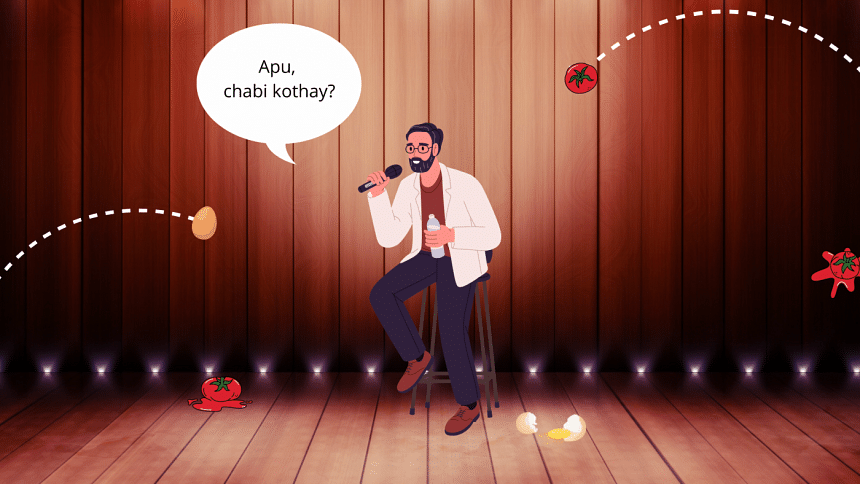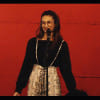Bangladeshi stand-up comedians can do a lot better

With clips of stand-up comedy making rounds on the internet, this particular form of art is now more popular than ever. But in the maze of popularity, the line between stand-up comedy and misogyny has often been blurred. From the lack of gender inclusivity in comedy to comedy at the expense of women, it's no secret that our local stand-up comedy scene is knee-deep in sexism.
The local comedy scene feels like a man's world everytime we see the line-up of comedians. Most live shows do not see any female comedians at all. Out of the few women who are venturing into stand-up comedy, one is Lubaba Mehzabeen.
As an emerging stand-up comedian, Lubaba has crossed some of the hurdles that bar women from entering into the comedy scene. When asked about the challenges female comedians in Bangladesh face, she said, "Societal expectations regarding how a woman should behave discourage girls from venturing into the comedy scene. Women are usually not encouraged to voice their opinion."
Lubaba talked of restrictions from family as a barrier too. The absence of women in stand-up comedy is perhaps just another evidence of a woman's lack of freedom to choose her passion and profession. What role the organisers and audience play in promoting female comedians was also a question that needs to be explored.
"Contrary to malicious people online, the audience who visit the shows are much more sensible and the organisers usually make it a point to raise enthusiasm about female comedians," Lubaba Mehzabeen said.
Though the organisers are positive towards the participation of women in comedy, the ratio of male to female performers says that there's still a lot to be done.
Moving aside from the participation of women, the use of women as a comedic subject has proven to be extremely problematic. One such instance happened in a show where the comedian made derogatory remarks about the female reproductive organ as a part of his joke. While one may say that the stand-up comedian had no malicious intentions, the problem is that whenever they let such misogynistic jokes slide they let misogyny be normalised in the mainstream media. This is specifically harmful as a significant portion of the stand-up comedy audience are young and impressionable adults.
While the comedy scene is abound with misogynistic jokes – often passed under the excuse of "Women can't take a joke" – it is also plagued with poor audience engagement. Oftentimes, we have seen stand-up comedians ask extremely inappropriate questions to the members of their audience. For an instance: a particular male comedian once asked a female member of his audience to explain why she laughed at an extremely sexual joke. While this article may not speak for everyone, we can vouch that many people would have felt extremely uncomfortable if they found themselves in such a situation.
Poor audience engagement also takes the form of bullying, where a member of the audience is targeted and fat shamed, for example. This is problematic not just for members of the audience but for stand-up comedians too, as such ill-suited practices do a disservice to audience retention.
As the local comedy scene is dominated by male comedians, it's only natural that the fair share of misogynist humor comes from male comedians. To get a different perspective on the subject, we asked Lubaba Mehzabeen how she, as a female comedian, feels about the unchecked misogyny in stand-up comedy. She said, "I'd like to believe that this tendency is decreasing with time. And as with any form of art, the audience can play a very crucial role in this regard. Not catering to such derogatory remarks can actually erase this practice."
The pioneer of stand-up comedy in Bangladesh, Naveed Mahbub, thinks that comedians should be strongly discouraged from using sexist or sexualised jokes. According to him, comedians often tend to use sexualised jokes just to get the audience laughing with very low effort. He believes that such low effort jokes are not what good comedians use to make the audience laugh.
While the reaction of the audience is a cue for the comedians on what works and what doesn't, it is ultimately on the comedian to be sensible with their jokes. As people who have taken the art of provoking laughter as a profession, they ought to make sure they are doing it responsibly. If professional stand-up comedians also rely on clichéd unfunny sexist tropes to make people laugh, is there really any difference between the guy on the stage and the one spewing misogyny on the dining table?
It is said that comedy is always at the expense of someone or something. Even self-deprecating humor comes at the expense of the comedians themselves. But sometimes we need to ask if the expense is worth it. It is time our local comedians ask themselves if the negative cost of misogynist humor is worth the peel of laughter. It's time for them to do better.
Noushin Nuri is an early bird fighting the world to maintain her sleep schedule. Reach her at [email protected]
Hrishik thinks he is a Physics nerd, but he is actually a Marxist at heart. Catch him discussing Hegelian dialectic at [email protected]

 For all latest news, follow The Daily Star's Google News channel.
For all latest news, follow The Daily Star's Google News channel. 








Comments